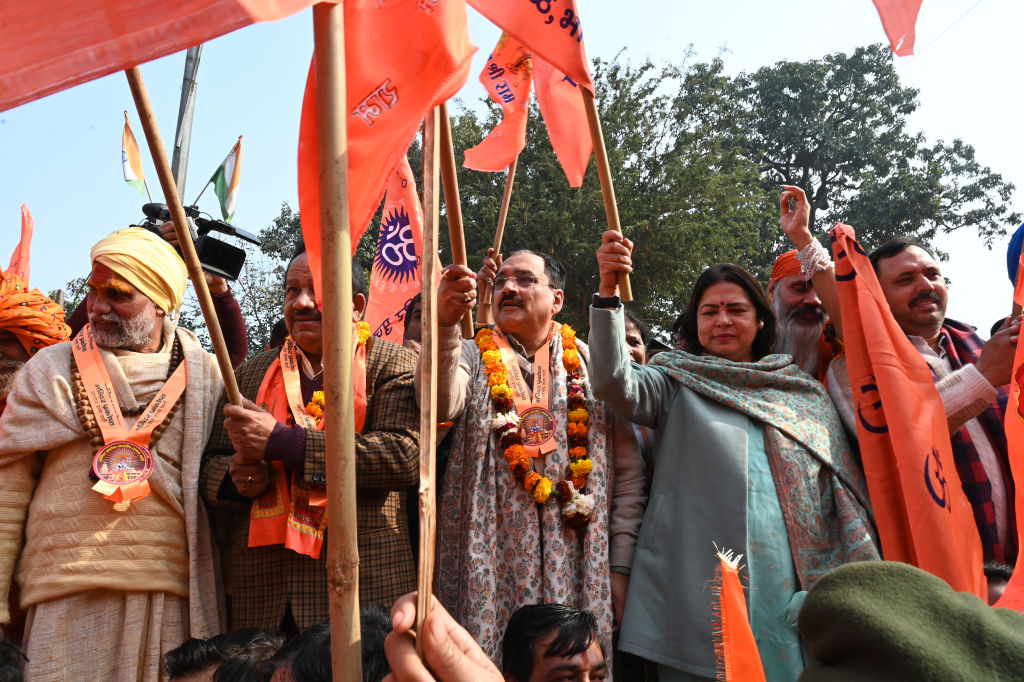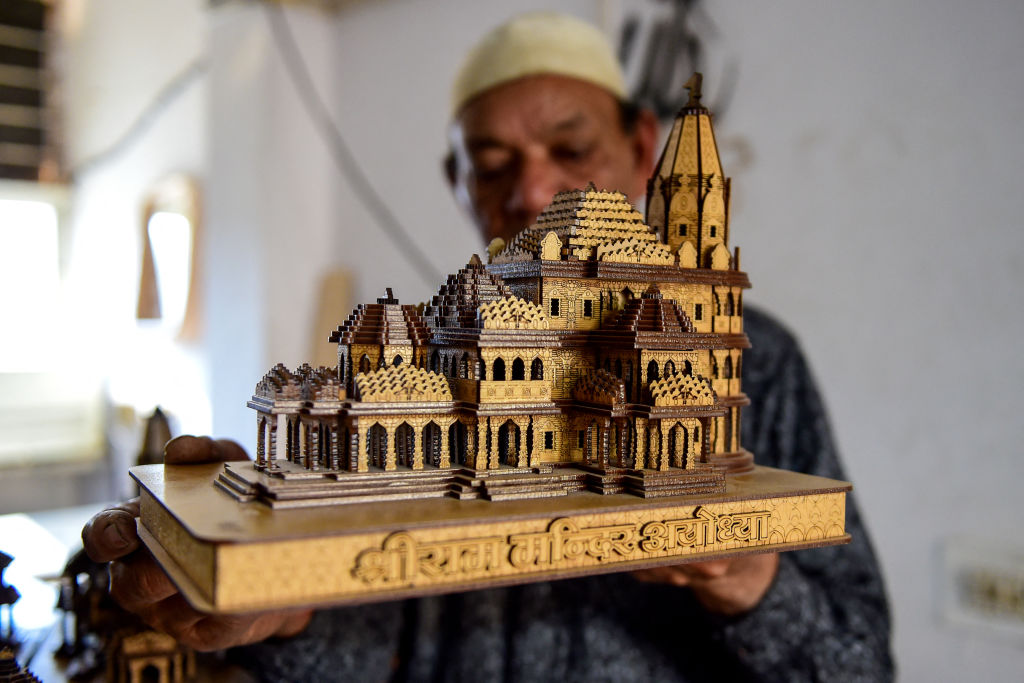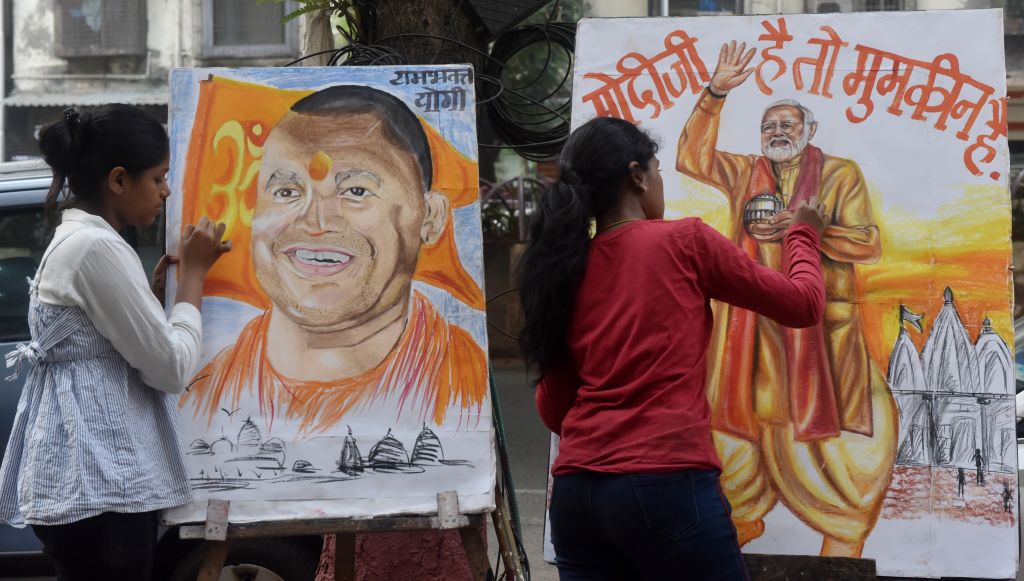A decades-long flashpoint in India’s sectarian politics reached a climax on Monday with the inauguration of a vast Hindu temple on a contested holy site that was once home to a mosque.
“After centuries of waiting, our Ram has arrived,” Indian Prime Minister Narenda Modi told thousands of attendees who flocked to the city of Ayodhya, in India’s northern Uttar Pradesh state, to bear witness to the consecration of the new Ram Mandir temple. “It is the beginning of a new era.”
For Hindus, the site marks the birthplace of Lord Ram, one of the most revered deities in the Hindu faith. But the site is also revered by India’s Muslims for having once housed the 16th century Babri Mosque, a monument of faith for Indian Muslims that stood on the site for centuries before it was razed by a Hindu nationalist mob in 1992. Sectarian riots ensued, killing some 2,000 people.
Read More: India’s Ayodhya Temple Is a Huge Monument to Hindu Supremacy
This fraught history barely featured in the jubilant celebrations surrounding the ceremony, which was viewed by millions of people. Several parts of the country declared the day a public holiday, with some even going so far as to restrict the sale of alcohol and non-vegetarian food. Saffron-colored flags and pennants, a symbol of Hindu nationalism, were raised across the country.
For Modi, whose Hindu-natioanlist government has overseen a steady rise in violence against Muslims and other religious minorities, the consecration represents the fulfillment of a decade-long pledge to rebuild the temple (the construction of which isn’t due to be completed until December). But it also signifies the unofficial start of his campaign to win a third consecutive term when Indians go to the polls in the spring for national elections. It’s for this reason that leaders of the opposition Congress Party opted to skip the ceremony, which they describe as nothing more than “a political project … obviously brought forward for electoral gain.”

While the Indian government, and indeed many Hindus, regard the Jan. 22 consecration as a celebratory occasion of immense national and religious importance, observers fear that the event could signify yet another nail in the coffin of India’s secular ethos. “The Ram Mandir revolves around some of the most divisive issues for religion and society in contemporary India,” Michael Kugelman, the director of the South Asia Institute at the Wilson Center in Washington, tells TIME in an email. “The temple consecration is papering over incredibly traumatic and heavily contested events in India’s history.”
Here’s what to know about the temple and its significance.
What is the significance of the Ayodhya site for Modi?
For Modi, the construction of the Ram Temple represents more than just the honoring of a decades-long Hindu nationalist pledge (rebuilding the temple, which was greenlit by India’s Supreme Court in 2019, has been a core project of Modi’s ruling Bharatiya Janata Party). It also cements his legacy as one of the country’s most consequential leaders—in particular, one who is helping to transform India from a secular democracy into an avowedly Hindu nation.

The Ram Mandir movement has been a throughline of Modi’s career, says Rana Ayyub, one of India’s most famous journalists and a renowned thorn in the side of Modi’s BJP. In 1990, as a local BJP leader in his native Gujarat, Modi helped organize a religious rally that aimed to gin up support for the construction of a temple to Lord Ram on the site of the Babri Mosque. In January 1992, less than a year before the mosque was destroyed, Modi pledged not to return to Ayodhya until a temple dedicated to Lord Ram was completed. Nearly three decades later, Modi oversaw the groundbreaking of the temple, likening it to “the day India gained independence.”
“His entire career has been based on Ayodhya because he realized early on that the only way to become a favorite of the masses is to endear them through the Ram Temple movement,” Ayyub says. “This is the ultimate moment of Modi as a Hindu nationalist leader, and this is the ultimate moment of creating the Indian Muslim as a second-class citizen.”
More From TIME
The temple consecration follows a number of other major political moves implemented by Modi in his efforts to advance his government’s Hindu nationalist agenda. This includes the passage of the contentious Citizenship Amendment Act in 2019 (a law extending Indian citizenship to religious minorities from neighboring countries that excludes Muslims, undermining India’s constitutionally mandated secularism) and the repeal of the special autonomous status of India-administered Kashmir, the country’s sole Muslim-majority state. “What unites these three things is that they work against Indian Muslims and Muslims more broadly,” says Kugelman, “and, by extension, strengthen the status and interests of Indian Hindus.”
How are India’s Muslims reacting?
For many Indian Muslims, who make up 15% of the population, the destruction of the Babri Mosque remains an open wound, says Ayyub. “To be constantly reminded of the scar,” she says, “and now to be told that the entire nation is celebrating this temple being built on a mosque—it’s like rubbing salt into an already existing wound.”

Beyond pain, however, Ayyub says many Indian Muslims also feel fear. For her part, she has instructed her family to be careful about how they react to WhatsApp messages within their housing society. “At this point in time, anything can be used as a grind against us,” she says. “This is like that moment that we all feared and it is at our doorstep right now, and we don’t know what to make of it.”
While authorities are expected to be on high-alert on the day of the consecration, some observers fear that the moment could spark unrest. “The government will be prepared and will pull out all the stops to have as much security as possible,” says Kugelman. “But it will be a tense moment for many, and especially Indian Muslims, despite New Delhi’s projection of the event as an opportunity for the nation to come together to celebrate.”
Read More: The Message the Ram Temple Sends Muslims Like Me
Smriti Irani, India’s minister of minority affairs, dismissed such concerns in the days leading up to the ceremony. “There is rule of law in India, there is a vibrant political and judicial presence in India, and there’s also a very strong media in India, so any citizen who knows that the four pillars of democracy are functional and independent of each other has no reason for concern,” she told TIME during an interview last week on the sidelines of the World Economic Forum in Davos, Switzerland, noting that the Jan. 22 ceremony “is a reflection of India’s not only diversity, but also patience.”
What impact is this expected to have on India’s upcoming election?
2024 stands to be a consequential election year for countries around the world, and India is no exception. Polls project that Modi, who remains widely popular, could win a third consecutive term. Experts such as Kugelman see the temple inauguration as a key element of his campaign.
“The temple consecration is a powerful reflection of Modi’s campaign strategy,” he says, noting that Modi has linked the temple with a series of neighboring infrastructure and welfare projects. “In that sense, he’s combining Hindu nationalism with social welfare—his two signature themes not only in this election, but in his broader politics. It’s a combination that’s worked well for him.”
More Must-Reads from TIME
- Caitlin Clark Is TIME's 2024 Athlete of the Year
- Where Trump 2.0 Will Differ From 1.0
- Is Intermittent Fasting Good or Bad for You?
- The 100 Must-Read Books of 2024
- Column: If Optimism Feels Ridiculous Now, Try Hope
- The Future of Climate Action Is Trade Policy
- FX’s Say Nothing Is the Must-Watch Political Thriller of 2024
- Merle Bombardieri Is Helping People Make the Baby Decision
Write to Yasmeen Serhan at yasmeen.serhan@time.com